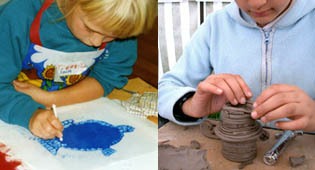











growing concerns
One size fits all
Very young children, from birth to 5yrs, will now be subject (in the UK) to an assessment regime following the introduction of compulsory educational goals in the new Early Years Foundation Stage (EYFS). Children have to be assessed regularly by all childcare providers, including childminders, particularly at 2 years and at 5 years. These targets cover seven 'early learning goals', which include literacy and numeracy requirements as well as ICT screen based technology.
resource link > EYFS Statutory Learning Goals
What is wrong with a curriculum and testing for under fives?
In these early years of life children have such huge variation in skills, abilities and experiences, progressing at different rates -
To set guidelines on good practice in early years, and provide the right environments for learning through play, with trained practitioners should be exactly what is needed.
This ideal, however, is undermined by setting standard assessment targets at this very young age, and extending the questionable practice of formal literacy and numeracy to commence at an even earlier age -
Other European countries, who do not start formal literacy and numeracy until 6 or 7 years, are achieving better results in international league tables. These countries believe it is more important to create firm foundations by allowing plenty of time for the development of children’s language, attention, and social skills through play and creative activities before starting formal education.
The history of educational research in child development and learning over the last 250 years confirms consistently that time for practical exploration is essential before more academic, formal learning. Evan more than this -
An example where even trained practitioners in a nursery school can get it wrong is clearly described by Catherine Gripton in Annie Woods book “Child Initiated Play & Learning: Planning for Possibilities in the Early Years” (publ. 2013):
"Observing the Maths Table:
In my capacity as a mathematics co-
The lead practitioners explained the frustration they felt that children did not choose to do mathematical activities, and asked how they could 'liven up' the maths table.
For me, the issue was not the maths table (although I advised them to dispense with it in favour of a pattern area or puzzle table) but the compartmentalisation of learning into subject areas, and then [into separate] physical areas of the environment.
There was an enormous amount of child initiated mathematical learning that morning across the nursery when playing with books, sand, dough, water, bikes, mark-
resource link > Annie Woods: Child Initiated Play & Learning
With every new curriculum comes the publication and production of quantities of new educational material -
These will be used both by their intended market, the trained practitioners, and by parents keen to get a head start. All geared towards presumed outcomes and desired test results.
This creates a very high possibility of inappropriate material and activities being set out as ‘learning’ tasks to do everyday, instead of imaginatively including the learning concepts in daily play activities. In doing so the child’s natural interest, delight and curiosity is at risk of being stifled and compromised.
Sue Palmer, author and a founder of Early Childhood Action, set up to speak out and highlight concerns about the early years ‘EYFS’ legislation, says:
"It’s time we recognised that too much too soon isn’t working. To give our under-
resource link > Sue Palmer: Schoolification Article
what do we mean -
• there is special knowledge and understanding to be gained by making things
• childhood plays a vital part in this innovative process
a historical perspective
• observation, trial and error
• origins of maths
• patterns and geometry
facing the future
growing concerns
• Neil MacGregor
• Sherry Turkle
• Seymour Papert